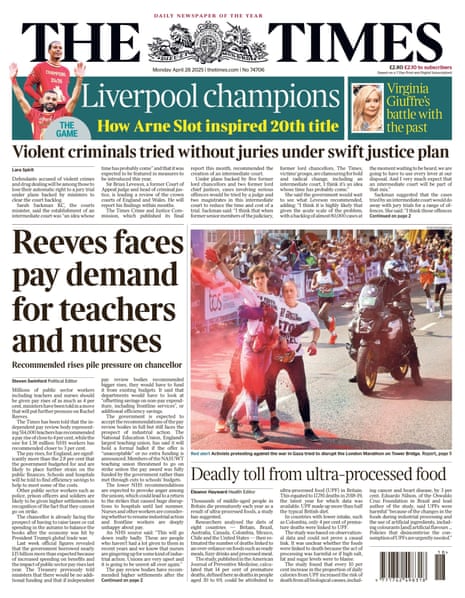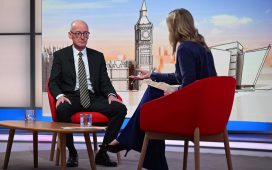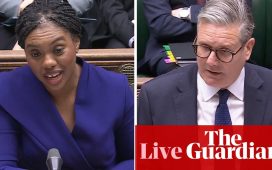Minister urges unions to accept government in ‘very challenging position’ over public sector pay
A minister has urged trade unions to accept that the government is in a “challenging” situation, following a report claiming the pay offers for teachers and nurses could provoke strikes.
Stephen Kinnock, the care minister, was responding to a report in the Times suggesting that public sectors workers could be offered above-inflation pay rises – but with the increases having to be funded from departmental savings, which is opposed by some unions.
In their Times story, Steven Swinford and Chris Smyth say:
Millions of public sector workers including teachers and nurses should be given pay rises of as much as 4 per cent, ministers have been told in a move that will put further pressure on Rachel Reeves.
The Times has been told that the independent pay review body representing 514,000 teachers has recommended a pay rise of close to 4 per cent, while the one for 1.38 million NHS workers has recommended closer to 3 per cent.
The pay rises, for England, are significantly more than the 2.8 per cent that the government budgeted for and are likely to place further strain on public finances. Schools and hospitals will be told to find efficiency savings to help meet some of the costs.
Swinford and Smyth say the NEU and NASUWT teaching unions have both threatened strike action if schools do not get extra funding to pay for the salary increase for teachers. And nurses have also not ruled out further strike action, they say.

Kinnock, who was doing an interview round for the government this morning, confirmed that the government was looking at the pay review body recommendations, and did not deny the figures quoted by the Times.
Referring to the more confrontational approach taken by the Tories, Kinnock told Times Radio the government wanted “a proper grown-up conversation” with unions “where we sit around the table and hammer it out rather than all the performative nonsense that we saw under the previous government”.
He said he hoped that unions would recognise that the government was in a “very challenging position”. He said:
We’re very keen to support working people across the country. But of course, we do need to also ensure that any pay deal that is done is within the fiscal constraints. And it is a very tight financial position. And I’m very hopeful that our colleagues in the trade union movement will recognise that.
Key events
No 10 confirms no extra money will be set aside for public sector pay rises beyond what has already been allocated
Downing Street has confirmed that there will be no extra money to fund pay rises for public sector workers beyond what was set out in last year’s budget.
Asked about a Times story saying that public sector pay bodies are recommending above-inflation increases, which might require the pay rises to be funded by savings elsewhere in departmental budgets, the PM’s spokesperson said “there’ll be no additional funding for pay if recommended awards exceed what departments can afford”.
According to the Times, public sector pay review bodies are recommending pay rises of as much as 4% for teachers and 3% for NHS workers. (See 10.04am.)
Asked about this, the spokesperson said:
The Treasury’s economic evidence published in December said that the budget set the spending envelope across the parliament and departmental settlements for 25-26 and beyond will need to fund the next round of public sector pay awards.
And there’ll be no additional funding for pay if recommended awards exceed what departments can afford.
The spokesperson the public sector pay bodies are now making their recommendations to government. The government will then have to respond, but “we are not at that stage of the process”.
Last year the government did accept the recommendations, he said.
Badenoch says Irish band Kneecap should be prosecuted over ‘kill MP’ footage
Kemi Badenoch has demanded the prosecution of Irish language rap trio Kneecap for allegedly calling for the death of Tory MPs, PA Media reports.
Video emerged of the group at a November 2023 gig appearing to show one member saying: “The only good Tory is a dead Tory. Kill your local MP.”
In a post on social media referring to a report saying the police are now assessing this footage, Badenoch said:
Good.
Kneecap’s glorification of terrorism and anti-British hatred has no place in our society.
Now footage shows one of them saying: “The only good Tory is a dead Tory. Kill your local MP.”
After the murder of Sir David Amess, this demands prosecution.
As the BBC reports, Amess’s daughter, Katie Amess, has said the band should apologise for “such dangerous, violent rhetoric”.
When Badenoch was business secretary, she blocked Kneecap from gettting a £14,000 arts grant because of their support for Irish reunification. She argued the government should not be supporting organisations opposed to the existence of the United Kingdom.
The band challenged this decision on discrimination grounds and last autumn a court overturned Badenoch’s decision. The Tory leader then criticised the Labour government for accepting the ruling and not appealing against it.
Kneecap’s management has been approached for comment in response to Badenoch’s demand for a prosecution.
Local elections will confirm five-party politics now the ‘new norm’, Prof John Curtice says
Prof Sir John Curtice, the elections expert, told the BBC’s Today programme this morning that it was particularly hard to predict the outcome of this year’s local elections in England because five parties are competitive. He said:
Almost undoubtedly, what we’re going to discover on Friday, when most local council results come in, is an awful lot of councillors being elected on a very low share of the vote. We are talking about an election in which five political parties are going to be serious competitors. We’ve got Reform at 25 in the national opinion polls, Labour at 24, the Conservative 22.
Yes, the Liberal Democrats are at 14, and the Greens are at 9. They are weaker. But they usually do better in local elections than they do in the national election. So we’re talking about five serious competitors.
Curtice said this would probably result in most of the councils where elections are taking place ending up under no overall control.
Asked if five-party politics was now the “new norm”, he replied:
It certainly looks like our new norm at the moment.
One of the things that a lot of people missed at the general election is that it was the first general election in the UK’s history in which five political parties fought virtually everywhere.
The Liberal Democrats have long had a [national] party organisation, along with Labour and the Conservatives. The Greens have developed one, and they are now represented everywhere. Reform were largely putting up paper candidates in the election. But one of the challenges they set themselves after the election was to start to create local party organisation. And what do we already know about these local elections – they’re actually fighting slightly more seats than any other party. They have found 1,640 candidates to fight virtually all the seats, and that is an indication of how Reform are also turning themselves into a permanent party organisation.
Asked how well he expected Labour to do, Curtice said that by his calculations “no previous newly-elected government has seen its support fall more heavily and more rapidly in the polls than has happened to this UK Labour government”. But he also pointed out that the council seats up for election were last contested in May 2021. That was when the Tories were popular, and when Boris Johnson won the Hartlepool byelection – a time Curtice described as “psephological pre-history”.
Parents to save £50 per year from law restricting right of schools to require branded uniform items, DfE says
The parents of four million children will get cheaper school uniforms because of a law reform making its way through parliament, the government has claimed. As PA Media reports, the Department for Education says its children’s wellbeing and schools bill will reduce uniform costs for families by £70m. PA says:
MPs have previously raised concerns about the high costs parents face in buying branded items of clothing for uniform.
Schools are required to limit the amount of branded uniform items but a survey has shown they are not doing so, with parents having to pay on average £442 for secondary school uniforms, and £343 for primary school uniforms.
As the House of Lords continues scrutiny of the bill, the government has insisted it will help to reduce the costs of school uniform by placing limits on the number of branded items schools can require children to have.
This limit will be three items, excluding school ties …
The new uniform laws will save parents £50 a year in the back-to-school shop, according to the DfE.
Badenoch says trans people can use disabled toilets, after EHRC says they are banned from toilets they identify with
Kemi Badenoch has suggested transgender people can use disabled toilets, following a supreme court ruling on gender.
In an interview with ITV’s Good Morning Britain, Badenoch said that she felt “very vindicated” by the supreme court’s ruling, which said that the word ‘woman’ should be interpreted in equality legislation to mean a biological woman.
In the light of the light of the ruling, the Equality and Human Rights Commission published interim guidance on Friday saying what the legal consequences of this ruling are. It says:
In workplaces and services that are open to the public … trans women (biological men) should not be permitted to use the women’s facilities and trans men (biological women) should not be permitted to use the men’s facilities, as this will mean that they are no longer single-sex facilities and must be open to all users of the opposite sex.
The guidance also says “where facilities are available to both men and women, trans people should not be put in a position where there are no facilities for them to use”. Where possible, mixed-sex toilet facilities should be provided, it says.
In an interview yesterday Pat McFadden, the Cabinet Office minister, said that, although he was not in favour of having “toilet police”, the court’s ruling means trans people are not allowed to use the toilet of the gender they identify with.
In her GMB interview, Badenoch said that for years trans people had been given “fake information” by campaigners about their rights. She said that she was glad the supreme court had now clarified the situation, upholding what she had always regarded as the correct interprtation of the law.
She said that two years ago, when she was equalities minister, she had issued guidance intended to address this. She went on:
This is not as complex a situation as it’s often made out to be. We managed to deal with this for a very long time without issues.
The thing that has created the biggest problem isn’t trans people. It is predatory men who used lax rules to say, ‘Oh, actually, I’m a woman now’ and go into women’s loos. And I’ve had letters from women who’ve been assaulted in their toilets.
Asked if trans people now needed their own toilet facilities, Badenoch said:
Most, if not all organisations have a way of dealing with this.
Not having gender-neutral loos is one of the easiest things that you can do.
Almost all businesses have disabled loos. They are unisex, different from gender neutral. Trans people can use those.
But if you are providing a single-sex space, it has to be a single-sex space. And the supreme court has said, as I always had, that sex is biological.
Minister urges unions to accept government in ‘very challenging position’ over public sector pay
A minister has urged trade unions to accept that the government is in a “challenging” situation, following a report claiming the pay offers for teachers and nurses could provoke strikes.
Stephen Kinnock, the care minister, was responding to a report in the Times suggesting that public sectors workers could be offered above-inflation pay rises – but with the increases having to be funded from departmental savings, which is opposed by some unions.
In their Times story, Steven Swinford and Chris Smyth say:
Millions of public sector workers including teachers and nurses should be given pay rises of as much as 4 per cent, ministers have been told in a move that will put further pressure on Rachel Reeves.
The Times has been told that the independent pay review body representing 514,000 teachers has recommended a pay rise of close to 4 per cent, while the one for 1.38 million NHS workers has recommended closer to 3 per cent.
The pay rises, for England, are significantly more than the 2.8 per cent that the government budgeted for and are likely to place further strain on public finances. Schools and hospitals will be told to find efficiency savings to help meet some of the costs.
Swinford and Smyth say the NEU and NASUWT teaching unions have both threatened strike action if schools do not get extra funding to pay for the salary increase for teachers. And nurses have also not ruled out further strike action, they say.
Kinnock, who was doing an interview round for the government this morning, confirmed that the government was looking at the pay review body recommendations, and did not deny the figures quoted by the Times.
Referring to the more confrontational approach taken by the Tories, Kinnock told Times Radio the government wanted “a proper grown-up conversation” with unions “where we sit around the table and hammer it out rather than all the performative nonsense that we saw under the previous government”.
He said he hoped that unions would recognise that the government was in a “very challenging position”. He said:
We’re very keen to support working people across the country. But of course, we do need to also ensure that any pay deal that is done is within the fiscal constraints. And it is a very tight financial position. And I’m very hopeful that our colleagues in the trade union movement will recognise that.
Ruth Perry’s sister joins calls to pause proposed Ofsted overhaul
The sister of a headteacher who took her own life after an Ofsted report has accused the government of ignoring a coroner’s findings on her death by failing to change the school inspection regime, Matthew Weaver reports.
Keir Starmer claims tech will take NHS out of ‘dark ages’ as report says A&E care worse than pre-Covid
Good morning. There are just three days of campaigning left before this year’s local elections. In some respects, these are a minor set of local elections. There are no elections in Scotland, Wales, Northern Ireland or London, and there are only about 1,600 council seats being contested. In some years there are more than 8,000 council seats up for grabs in England alone. But the elections have also been described as the most important for a generation, because they are expected to confirm the emergence of Reform UK as a permanent, significant political force. At the very least this would prove that the old, two-party political model is broken, replaced by a four-party system – what the Economist calls a “20-20-20-20” system – Labour, the Tories, Reform UK and the Lib Dems all hovering at around 20% of the vote – or a five-party system, if you include the Greens. Or it could even mean that the Conservative party is on its way out.
Keir Starmer and Kemi Badenoch have both got campaign events lined up today. Starmer is keen to talk about the NHS and, in a message on social media, he made a bold claim this morning – arguing that Labour is taking the NHS out of “the dark ages”.
Our NHS has been stuck in the dark ages — that ends now.
By using the latest technology and expanding the NHS app, my government will slash waiting lists, get patients seen faster, and save taxpayers money.
Starmer has provided the quote in a news release highlighting figures showing that, by increasing the use of the NHS app, the government is making the NHS more efficient. The Department of Health and Social Care says:
Latest data shows 1.5 million appointments have been saved thanks to the government’s accelerated rollout of the NHS app, which helps patients access treatment more conveniently so that it fits around their lives, rather than the other way round.
Making sure patients get greater power over how and when they can book their treatments and appointments is at the heart of the government’s plans to end hospital backlogs and improve care through the Plan for Change.
Users can manage appointments, view prescriptions, access their GP health record, and receive notifications at the touch of a button, reducing stress on healthcare services and providing easier access to information and services.
The government has exceeded its first target under the plan to increase the number of hospitals allowing patients to view appointment information via the app up to 85% by the end of March – reaching 87%, up from 68% in July 2024.
This is welcome news, but people may question whether it amounts to the end of the dark ages. It is also a bit Matt Hancock (which is not necessarily a bad thing, but which serves as a reminder that improving the NHS’s use of tech has been a cross-party goal for years).
The DHSC announcement coincides with the release of a report from the Health Foundation, a leading health thinktank, giving a different take on the NHS. It says A&E care in England is “far worse” now than before the pandemic. It says:
This winter saw the NHS in distress. Only 73% of A&E patients were treated within 4 hours, similar to the last two winters, and far below the 95% constitutional standard. The number of people experiencing 12-hour waits before admission reached a new record high. Numbers of A&E diverts and ambulance handover delays were worse than over previous winters …
Overall, the conditions this winter, while severe, were similar to those in recent years and not far above what the NHS can normally expect. Attributing operational problems to external factors such as winter illnesses and higher demand risks offering false comfort about the resilience of the health service.
Our analysis shows the health service performing far worse than before the pandemic and reporting record or near-record levels of operational problems across urgent and emergency care. Ahead of the government’s forthcoming Urgent and Emergency Care Plan, this raises key questions about what might be behind some of the underlying issues contributing to what has now become an annual winter crisis.
Here is the agenda for the day.
Morning: Keir Starmer is on a vist in the north-west of England.
11am: Plaid Cymru is publishing its economic plan for Wales at at event in Ammanford.
11.30am: Downing Street holds a lobby briefing.
Morning: Nigel Farage, the Reform UK leader, is campaigning in Melton Mowbray in Leicstershire. In the afternoon he will be in Salisbury.
Early afternoon: Kemi Badenoch is on a visit in Lincolnshire, where she is due to speak to the media.
2.30pm: Bridget Phillipson, the education secretary, takes questions in the Commons.
2.30pm: John Swinney, Scotland’s first minister, gives a speech to the Scottish TUC conference.
Afternoon: Starmer is meeting Mohammad Mustafa, prime minister of the Palestinian national authority, in Downing Street.
If you want to contact me, please post a message below the line when comments are open (normally between 10am and 3pm at the moment), or message me on social media. I can’t read all the messages BTL, but if you put “Andrew” in a message aimed at me, I am more likely to see it because I search for posts containing that word.
If you want to flag something up urgently, it is best to use social media. You can reach me on Bluesky at @andrewsparrowgdn.bsky.social. The Guardian has given up posting from its official accounts on X but individual Guardian journalists are there, I still have my account, and if you message me there at @AndrewSparrow, I will see it and respond if necessary.
I find it very helpful when readers point out mistakes, even minor typos. No error is too small to correct. And I find your questions very interesting too. I can’t promise to reply to them all, but I will try to reply to as many as I can, either BTL or sometimes in the blog.










